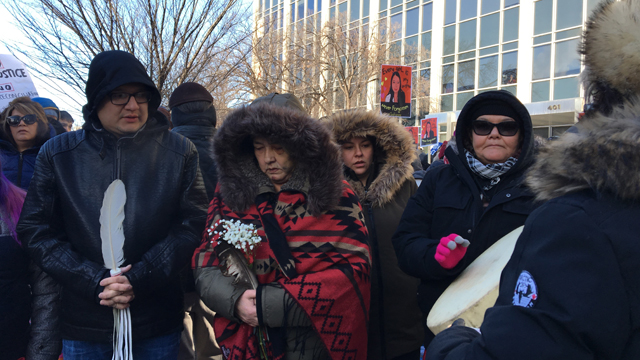The smell of sage filled the cool Winnipeg winter air as hundreds of people took to the streets to honour Tina Fontaine.
On Thursday, an 11-person jury found Raymond Cormier, 56, not guilty of second-degree murder in the death of Fontaine.
The verdict sent a ripple of emotions across Turtle Island, and left Indigenous leaders, supporters, family and friends calling for changes to protect Indigenous youth.
“We all feel it because it could have been our daughter. It could have been our granddaughter. We don’t want this to continue. We want this to stop,” said Thelma Morrisseau, a co-organizer for the Winnipeg rally.
Outside the courthouse Thursday Manitoba Keewatinowi Okimakanak Grand Chief Sheila North said justice still needs to be served.
“It might not be this accused person who took her life but someone took her life. That fact remains.” North told reporters. “We must get to the bottom of it.”
Fontaine’s 72-pound body, wrapped in a duvet and weighted down with rocks, was pulled from Winnipeg’s Red River on Aug. 17, 2014.
In December 2015, Cormier was charged in connection to her death after a lengthy police investigation, which included a six-month undercover operation called Project Styx. Cormier was placed in a bugged apartment for free and an undercover officer moved into a suite on the same floor.
Cormier was recorded saying he’d bet the girl was killed because he found out she was only 15 years old.
“I drew the line and that’s why she got killed,” he said.
Much of the Crown’s case relied on these recordings.
At Friday’s rally dozens of drums came together as one when the crowd marched from Manitoba’s Law Courts to Oodena Circle at The Forks.
Thelma Favel, Fontaine’s great-aunt and primary caregiver, gave a short but emotional thanks to supporters.
“My heart is overflowing with love and gratitude for each and every one of you,” said Favel.
Fontaine was originally from Sagkeeng First Nation located 120 km north of Winnipeg. She was in the city for about six weeks before she was found dead. In those weeks she had contact with child and family services, police, security officers and hospital staff. Many have said those systems failed her.
Favel blames herself.
“Everything I tried to do failed her,” said Favel. “We did what we could to bring justice for my baby girl.”

When Fontaine died there were renewed calls for a national inquiry into missing and murdered Indigenous women and girls. That inquiry launched in September 2016. Commissioners just wrapped up a hearing in Rankin Inlet, Nunavut when the verdict dropped.
Marilyn Courchene, a band councillor in Sagkeeng First Nation, criticized the inquiry and commissioners for not providing support to the family at the rally.
“They should have been standing with us today,” she said. “They fly all over Canada. They could have flown over here and said, ‘Thelma, we’re here for you. We’ll help you with the supports.’”
On Thursday the inquiry did release a statement extending their support to Fontaine’s family.
“Tina’s death woke up the nation to the issues of violence and marginalization Indigenous women and girls are subjected too,” the statement said.
Fontaine’s death also revived the Bear Clan Patrol Group.
James Favel, co-founder of the Bear Clan, said Thursday’s verdict, along with the outcome from the shooting death of Colten Boushie, has left the community with no faith in the justice system.
“I don’t think anyone in my community really expected a guilty verdict. And that’s what’s sad. We don’t even have the expectations of justice anymore,” said Favel.
Nahanni Fontaine, an advocate for MMIWG and NDP MLA, said Fontaine represented so many missing and murdered women and girls.
“She was our hope. She was families chance at justice. And at hope and faith in the community justice system, and we failed her,” she said.
Other rallies are planned across Turtle Island over the weekend.










Incidents like this have been going on for decades but it’s about time it got media attention! When White people commit crimes against Aboriginals they may not even get charged and if they’re charged they’ll get a slap on the wrist. When Aboriginals commit crimes they get a heavy sentence compared to White people who commit the same crime.
Incidents like this have been going on for decades but it’s about time it got media attention! When White people commit crimes against Aboriginals they may not even get charged and if they’re charged they’ll get a slap on the wrist. When Aboriginals commit crimes they get a heavy sentence compared to White people who commit the same crime.